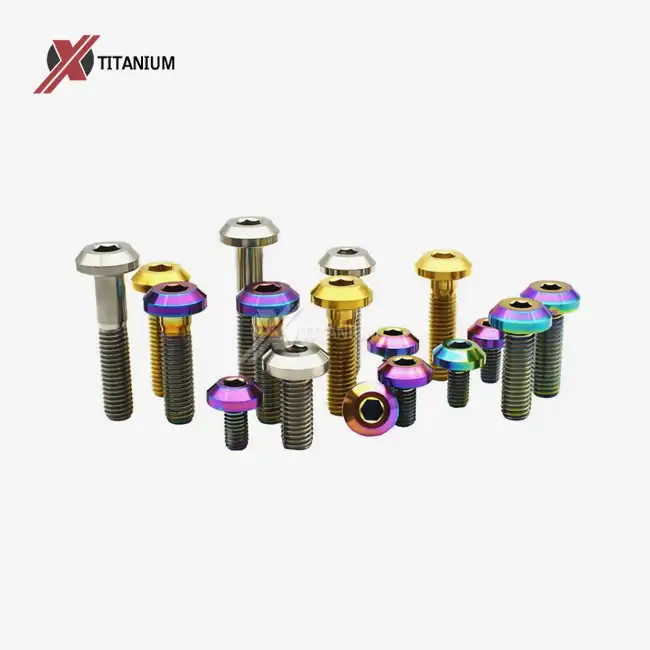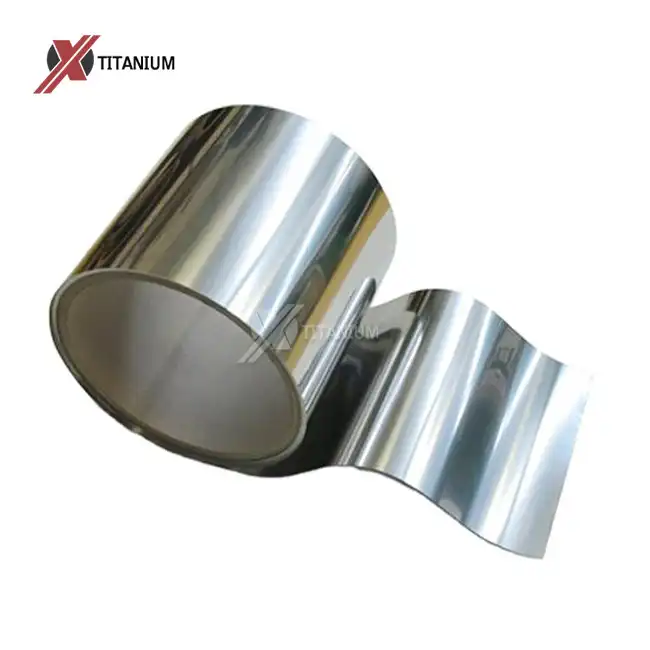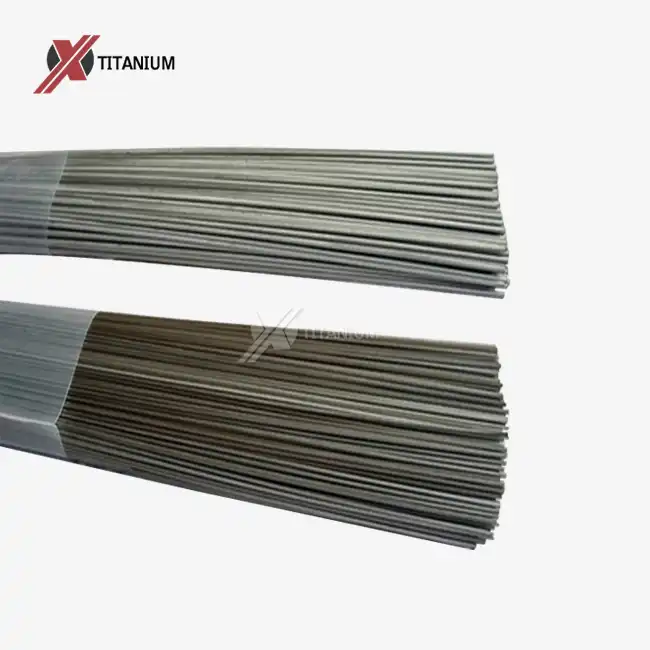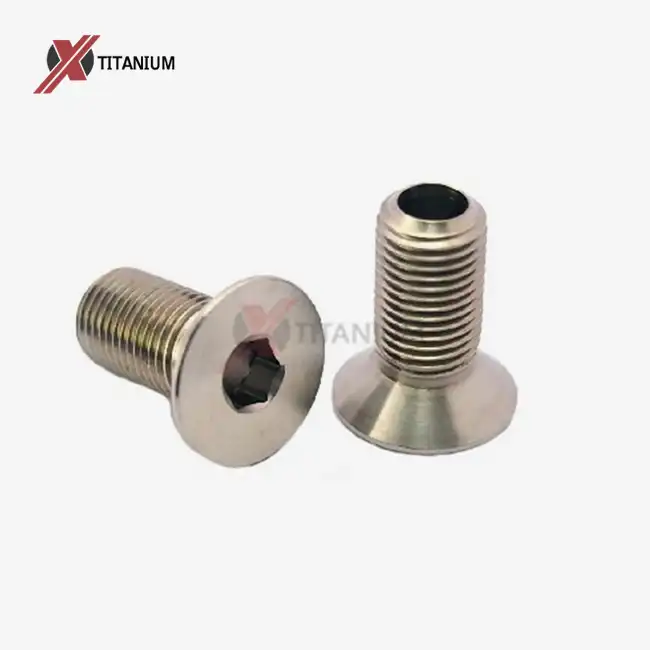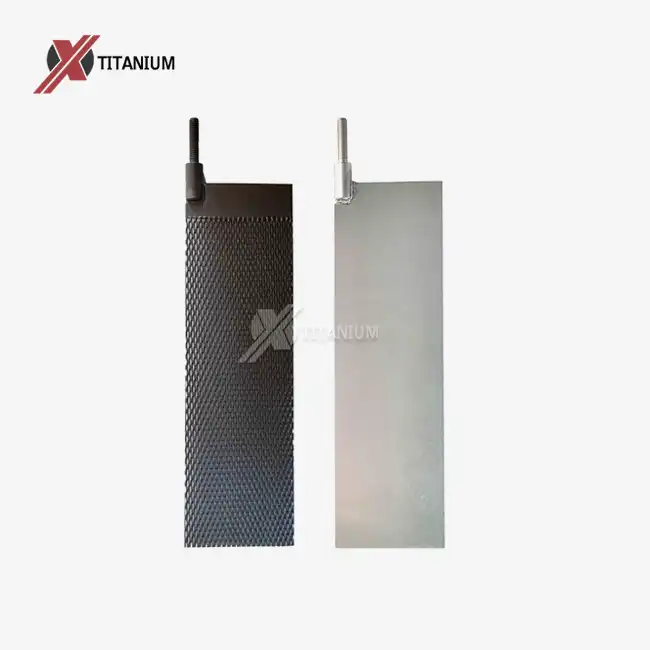The Evolution of Motorcycle Disc Bolts: From Steel to Titanium
The journey of motorcycle disc bolts from humble steel components to cutting-edge titanium marvels is a testament to the relentless pursuit of performance in the motorcycling world. Initially, steel bolts were the norm, offering adequate strength but at the cost of added weight. As the demand for lighter, more agile motorcycles grew, manufacturers began exploring alternative materials.
Aluminum bolts emerged as a lightweight option, but concerns about their long-term durability in high-stress applications limited their adoption. The breakthrough came with the introduction of titanium alloys in motorcycle engineering. Titanium, with its exceptional strength-to-weight ratio, quickly proved its worth in various motorcycle components, including disc bolts.
Advantages of Titanium Over Traditional Materials
Titanium motorcycle disc bolts offer a plethora of advantages over their steel and aluminum counterparts. The most notable benefit is their remarkable strength-to-weight ratio. Titanium bolts can match or exceed the strength of steel while weighing significantly less. This weight reduction, though seemingly small, contributes to improved handling and performance, especially in racing scenarios where every gram counts.
Corrosion resistance is another hallmark of titanium bolts. Unlike steel, which can rust over time, titanium forms a protective oxide layer when exposed to air, making it highly resistant to corrosion. This property is particularly valuable for motorcycles exposed to diverse weather conditions or used in coastal areas where salt air can accelerate corrosion.
Furthermore, titanium's superior fatigue resistance ensures that the bolts maintain their integrity even under repeated stress cycles. This translates to enhanced reliability and safety, crucial factors in high-performance motorcycling. The material's ability to withstand extreme temperatures without compromising its mechanical properties adds another layer of versatility to titanium disc bolts.
The Impact on Performance and Safety
The adoption of titanium motorcycle disc bolts has had a profound impact on both performance and safety. In terms of performance, the reduced weight of titanium bolts contributes to lower unsprung mass, which in turn improves suspension responsiveness and overall handling. This can be particularly noticeable in racing conditions, where split-second improvements in cornering and acceleration can make the difference between victory and defeat.
Safety-wise, the superior strength and fatigue resistance of titanium bolts provide an extra margin of security. The risk of bolt failure due to metal fatigue or corrosion is significantly reduced, offering peace of mind to riders pushing their machines to the limit. Additionally, the consistent performance of titanium bolts across a wide temperature range ensures reliable braking performance in various riding conditions.
Selecting the Right Titanium Disc Bolts for Your Motorcycle
Choosing the appropriate titanium motorcycle disc bolts requires careful consideration of several factors. The first step is ensuring compatibility with your specific motorcycle model and brake system. Different manufacturers may have varying specifications for bolt size, thread pitch, and head design.
When selecting titanium disc bolts, pay close attention to the grade of titanium used. Grade 5 titanium (Ti6Al4V) is widely recognized as the optimal choice for motorcycle applications due to its excellent balance of strength, weight, and cost-effectiveness. However, some high-end manufacturers may offer bolts made from even more advanced titanium alloys for specialized applications.
Key Features to Consider
Several key features distinguish high-quality titanium motorcycle disc bolts from standard options. Look for bolts with precision-engineered threads that ensure a secure fit and reduce the risk of loosening under vibration. Some manufacturers offer bolts with specialized coatings or treatments to enhance their already impressive corrosion resistance or provide additional lubrication properties.
The bolt head design is another crucial factor. Hex-head bolts are common and offer good tool engagement, but some riders prefer bolts with a low-profile head design to minimize aerodynamic drag and enhance the overall aesthetic of their motorcycle. Additionally, consider bolts with built-in washers or flange designs that distribute load more evenly and prevent damage to the disc or hub.
Installation and Maintenance Best Practices
Proper installation of titanium motorcycle disc bolts is crucial to ensure optimal performance and safety. Always follow the manufacturer's torque specifications, as titanium bolts may require different torque values compared to steel bolts. Over-tightening can lead to bolt failure, while under-tightening may result in loosening during operation.
Use a calibrated torque wrench and apply a small amount of anti-seize compound to the threads to prevent galling – a common issue with titanium fasteners. It's also advisable to use new locking washers or thread-locking compounds as specified by the manufacturer.
Maintenance of titanium bolts is relatively straightforward due to their corrosion resistance. Regular visual inspections for signs of wear or damage are recommended. If you frequently ride in harsh conditions or participate in racing events, consider implementing a scheduled replacement program for these critical components, even if they show no visible signs of wear.
The Future of Titanium in Motorcycle Engineering
As we look towards the future, the role of titanium in motorcycle engineering is poised for significant expansion. The ongoing development of new titanium alloys and manufacturing techniques is opening up possibilities for even lighter, stronger, and more cost-effective components. This evolution is not limited to disc bolts but extends to various other motorcycle parts, including frame elements, suspension components, and exhaust systems.
Advancements in 3D printing technology are particularly exciting for titanium motorcycle parts. This manufacturing method allows for complex geometries and internal structures that were previously impossible or prohibitively expensive to produce. For titanium motorcycle disc bolts, this could mean designs that are even lighter while maintaining or improving upon current strength characteristics.
Emerging Trends in Titanium Bolt Design
Advancement in titanium bike plate jolt plan is progressing, with a few rising patterns worth noticing. One region of center is the advancement of jolts with coordinates sensors that can screen torque, temperature, and other basic components in real-time. This innovation might give riders with priceless information on the condition of their brake framework and caution them to potential issues some time recently they ended up basic.
Another trend is the exploration of hybrid materials, combining titanium with other advanced materials like carbon fiber or ceramics. These composite bolts could offer even better performance characteristics, such as improved vibration damping or heat dissipation.
Surface treatment innovations are moreover progressing, with modern coatings and wraps up being created to improve the as of now noteworthy properties of titanium. These medications can advance progress erosion resistance, decrease contact, or indeed give self-healing properties to minor surface harm.
Environmental Considerations and Sustainability
As the motorcycle industry, like many others, moves towards more sustainable practices, the role of titanium is coming under scrutiny. While titanium components like disc bolts offer advantages in terms of longevity and performance, the environmental impact of titanium production is a concern.
However, the recyclability of titanium is a significant positive factor. Unlike some composite materials, titanium can be recycled without loss of quality, making it a more sustainable choice in the long run. Additionally, the durability and longevity of titanium parts mean they need to be replaced less frequently, reducing waste over time.
Manufacturers are also investing in more efficient and environmentally friendly titanium production methods. These include using renewable energy sources in the energy-intensive process of titanium extraction and refining, as well as developing closed-loop recycling systems for titanium waste produced during manufacturing.
Conclusion
The adoption of titanium motorcycle disc bolts represents a significant leap forward in motorcycle engineering. These high-performance fasteners offer a compelling combination of strength, lightweight properties, and durability that is transforming the riding experience for professionals and enthusiasts alike. Looking forward to 2025, the continued innovation in titanium alloys and manufacturing techniques promises even more exciting developments in this field.
For riders looking to upgrade their motorcycles with the best titanium disc bolts, it's crucial to choose products from reputable manufacturers and ensure proper installation and maintenance. The investment in high-quality titanium components can significantly enhance the performance, safety, and longevity of your motorcycle.
For more information on titanium motorcycle disc bolts and other high-performance titanium components, please contact us at info@cltifastener.com or djy6580@aliyun.com. Our team of experts is ready to help you find the perfect titanium solutions for your motorcycle needs.
